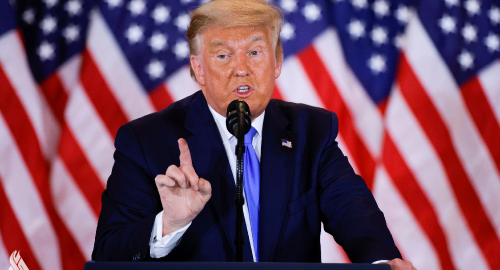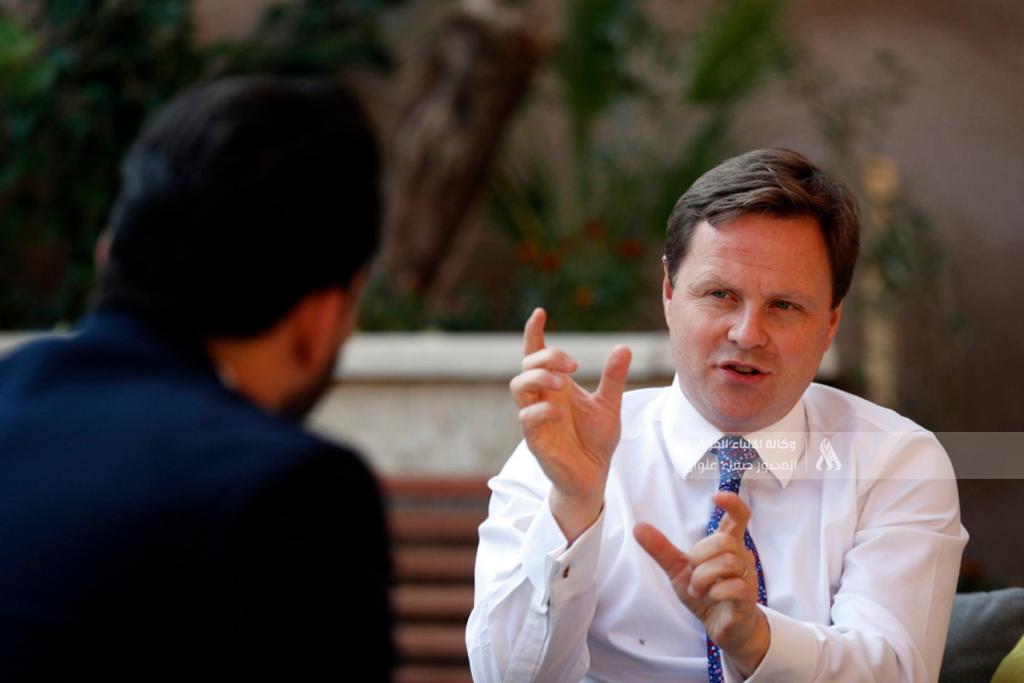
Trump, who as president fomented an insurrection, says he is running again

- 16-11-2022, 08:51
INA- sources
Donald Trump, the twice-impeached former president who refused to concede defeat and inspired a failed attempt to overturn the 2020 election culminating in a deadly attack on the U.S. Capitol, officially declared on Tuesday night that he is running to retake the White House in 2024.
The announcement at his Florida Mar-a-Lago Club came in a moment of political vulnerability for Trump as voters resoundingly rejected his endorsed candidates in last week’s midterm elections. Since then, elected Republicans have been unusually forthright in blaming Trump for the party’s underperformance and potential rivals are already openly plotting challenging Trump for the nomination.
Trump has been eager to reclaim the spotlight and pressure Republicans to line up behind him, inviting prominent party leaders to his launch event and keeping track of who attended. Advisers spent much of the year lobbying Trump to hold off announcing until after the midterms, arguing that he might motivate Democratic voters or get drowned out by election news. He finally agreed to promise a “very big announcement” for Tuesday, and stuck with that plan despite further efforts to convince him to wait until after next month’s runoff for a Georgia Senate seat.
“This comeback starts right now,” Trump said Tuesday night at his Mar-a-Lago resort, the site three months ago of an FBI search warrant to recover records he took from the White House, including some that were highly classified. He added later, “In order to make America great and glorious again, I am tonight announcing my candidacy for president of the United States.”
Trump’s attorneys filed paperwork Tuesday night with the Federal Election Commission for a newly named “Donald J. Trump for President 2024” committee. The filing said the new campaign would coordinate with an existing Trump Save America Joint Fundraising Committee, allowing him to potentially raise money at the same time for other political efforts.
Trump’s urgency to announce also comes from wanting to get ahead of a potential indictment in any of the several ongoing criminal investigations into his conduct. He and close associates are under multiple criminal investigations: by the Justice Department for the effort to submit phony electors claiming Trump won key states in the 2020 election and for the mishandling of classified documents recovered from Mar-a-Lago; and by an Atlanta-area prosecutor for pressuring Georgia officials to overturn that state’s election results. His company is also in the middle of a trial for criminal tax fraud and the New York attorney general filed a lawsuit that could freeze the company’s operations, already winning the appointment of an independent monitor.
A defeated former president running for election again while facing potential criminal indictment is unprecedented in U.S. history. Trump becomes the first former president to run again since Theodore Roosevelt, and the first since Grover Cleveland to do so after losing reelection. He is the only president to be impeached twice, and the only one impeached by a bipartisan vote.
Almost two years on, Trump’s divisiveness has remained a defining feature of American politics, reshaping the Republican Party in his image as much as he has mobilized Democrats against him and strained the checks and balances in every branch and level of government. In exit polls by AP VoteCast, 54 percent of voters said they had an unfavorable view of Trump, including 44 percent who were “very unfavorable.” The same survey found 34 percent of midterm voters said they cast their ballot to express opposition to Trump, with 22 percent who said they were voting as an expression of support for him and 41 percent who said he wasn’t a factor.
The GOP’s disappointing midterm results have heightened efforts within the party to move on from Trump. On Monday, David McIntosh, president of the conservative Club for Growth, said the group’s research showed Trump’s attacks on other Republicans are taking a toll on his support and joined calls for him to delay his announcement until after the Georgia runoff. Many of the party’s top donors, who were often not Trump’s biggest fans to begin with, have begun private conversations about how best to sideline him for a new generation of leaders, according to people in touch with them.
“He’s doing it from a place of defensiveness, of his own self-opportunity and weakness,” New Hampshire Gov. Chris Sununu (R), fresh from a 16-point win in the first presidential primary state, said in an interview earlier Tuesday outside the Republican Governors Association meeting in Orlando. “So he’s announcing he’s going to run for president at a low point in his political career. I don’t know how that’s going to work out, man.”
Trump is plowing ahead amid a broader reckoning for the party’s leadership after last week’s disappointments. In the House, Kevin McCarthy (R-Calif.) handily won a party leadership election Tuesday but still needs to line up enough votes for an outright majority of the chamber in January. In the Senate, several Republicans have called for postponing leadership elections until after the Georgia runoff, and Sen. Rick Scott (Fla.) announced a challenge to longtime leader Mitch McConnell (Ky.). Several challenges have also been floated to Republican National Committee chairwoman Ronna McDaniel, though her position appears to remain secure.
Trump’s candidacy also increases the likelihood that President Biden runs for reelection, setting up a rematch of the 2020 campaign, according to the president’s advisers.
On Tuesday night, Biden tweeted from his personal account: “Donald Trump failed America.”
Despite his vulnerabilities, Trump enters the presidential race with clear advantages. He has amassed a roughly $69 million war chest that he will be legally barred from using to fund his campaign but could route to a super PAC to support his candidacy without direct coordination. He can also benefit from the massive database of donors that his old group built up and he remains the party’s best fundraiser, frequently appearing in solicitations for other candidates and committees. He is also the party’s biggest draw for rallies, routinely packing events with thousands of fans, and his endorsements proved decisive in many primaries, even if many of those candidates went on to lose in November. In the AP VoteCast exit polls, 66 percent of Republicans and Republican-leaning independents said they considered themselves to be supporters of the Make America Great Again movement.
DeSantis brushed back at Trump’s swipes earlier on Tuesday, saying at a news conference, “I would just tell people to go check out the scoreboard from last Tuesday night.”
In a closed-door speech at the governors’ meeting, former New Jersey governor Chris Christie, once a close Trump adviser, criticized the former president and other divisive candidates, saying the party would lose if it kept nominating unelectable people and emphasizing that voters “rejected crazy,” according to attendees. More surprising than Christie’s remarks, they said, were the rounds of ovation they received.
Trump has made clear that former vice president Mike Pence would not return as his running mate. According to testimony to the House committee investigating the Jan. 6, 2021, attack on the U.S. Capitol, Trump profanely lambasted Pence for refusing to overturn the electoral college results, sympathized with rioters chanting for Pence’s hanging and never called Pence to check on his well-being. At recent rallies, Trump has mocked Pence’s single-digit standing in early primary polls.
“I really do believe we’ll have better choices,” Pence told a TV interviewer Tuesday when asked if he’d support Trump in 2024.
In Pence’s place, Trump’s inner circle believes an ideal No. 2 would embody at least some of Pence’s attributes — absolute subservience and a willingness to spout the Trump line, both publicly and privately, no matter how outrageous. Trump has made complimentary remarks recently about Sen. Tim Scott (R-S.C.) and South Dakota Gov. Kristi L. Noem (R).
Trump’s campaign will be led by Florida operative Susie Wiles, veteran strategist Chris LaCivita, and former White House political aide Brian Jack. His son Donald Trump Jr. is increasingly involved in the political operation, whereas daughter Ivanka Trump and her husband Jared Kushner have drifted away since leaving the White House. Donald Trump also frequently speaks with loyalist Boris Epshteyn, but many of Trump’s other advisers, lawyers and consultants say they talk to him less often than they once did.
Among the changes in Trump’s life since leaving office is that the lifelong New Yorker changed his voter registration to Florida, an increasingly GOP-leaning state, and lists his Mar-a-Lago Club as his primary residence rather than Trump Tower in Manhattan.
Trump has publicly indicated that a second term would double down on his brand of combative, nationalist politics and a drastic policy agenda. In his speech on Tuesday, Trump repeated his call for executing drug dealers, modeled off authoritarian governments like China and Singapore, and suggested he will be more aggressive in deploying federal forces against crime, unrest and protests. “If they don’t want our help, we’re going to insist that they take our help this time,” Trump said.
As he continues to insist without evidence that Biden benefited from subterfuge and fraud, Trump renewed his demand for sweeping restrictions on voting, including ending early voting (currently in use in 46 states) and voting by mail (available without an excuse in 35 states). “I’ll get that job done,” he said Tuesday. “That’s a very personal job for me.”
Alumni of Trump’s administration have been working to assemble rosters of appointees and shovel-ready policies to supply a return to power with more discipline and efficiency than before.
The packed ballroom at Mar-a-Lago on Tuesday night was a mash-up of a Trump rally and a glitzy gala, with superfans sporting costumes such as a brick-printed suit (“Build the Wall”), Bikers for Trump in leather vests and about a dozen members of the “Front Row Joes,” who travel around to every Trump rally. The hundreds of attendees included alumni of the Trump White House such as former Office of Management and Budget head Russ Vought, speechwriter Stephen Miller, former acting intelligence director Ric Grenell, former acting attorney general Matthew Whitaker, former Pentagon aide Kash Patel and former aide Sebastian Gorka.
All eras of Trump’s political life were represented, from advisers Roger Stone and Michael Glassner to lawyer Christina Bobb. Republican officials included outgoing Rep. Madison Cawthorn (N.C.), Texas Attorney General Ken Paxton (R) and Michigan GOP chair Meshawn Maddock. Other invitees included MyPillow CEO and election conspiracy theorist Mike Lindell and right-wing online prankster Alex Stein.
About 15 minutes into Trump’s speech on Tuesday, he appeared to become frustrated with his prepared remarks and started extended riffs more similar to his usual rally material. Addressing the midterm results, Trump agreed that Republicans should have done better and predicted the party would gain more support as conditions worsen.
“The citizens of our country have not yet realized the full extent and gravity of the pain our nation is going through and the total effect of the suffering is just starting to take hold,” he said. “They don’t quite feel it yet, but they will very soon.”
Since winning his party’s nomination in 2016, Trump has driven a partisan realignment — inspiring massive turnout among rural and non-college-educated White voters while pushing more prosperous suburban parts of the country into the Democratic column. He has also overseen a dramatic shift in the ideological focus of the American right, embracing a more restrictive approach to immigration, a more skeptical view of foreign military intervention and a new interest in tariffs as a way to protect American industry.
And he has profoundly altered the tenor of American public life — shattering long-held standards of decorum and civility with often shocking attacks on political rivals, judges and reporters. He has frequently made racist and antisemitic remarks, mocked people with disabilities and denigrated developing countries, bragged about sexual assault and paid hush money to a porn star, praised dictators, declined to disavow extremists, inspired his supporters to resort to violence and defended white supremacists and Jan. 6 rioters.
source : the Washington post
Duhok of Iraq and Qadsia of Kuwait match kicks off
- Sport
- 25/04/15
Four Daesh terrorists detained in Salahuddin
- Security
- 25/04/14
Two ISIS hideouts destroyed, killing those inside in Salah al-Din
- Security
- 25/04/13












